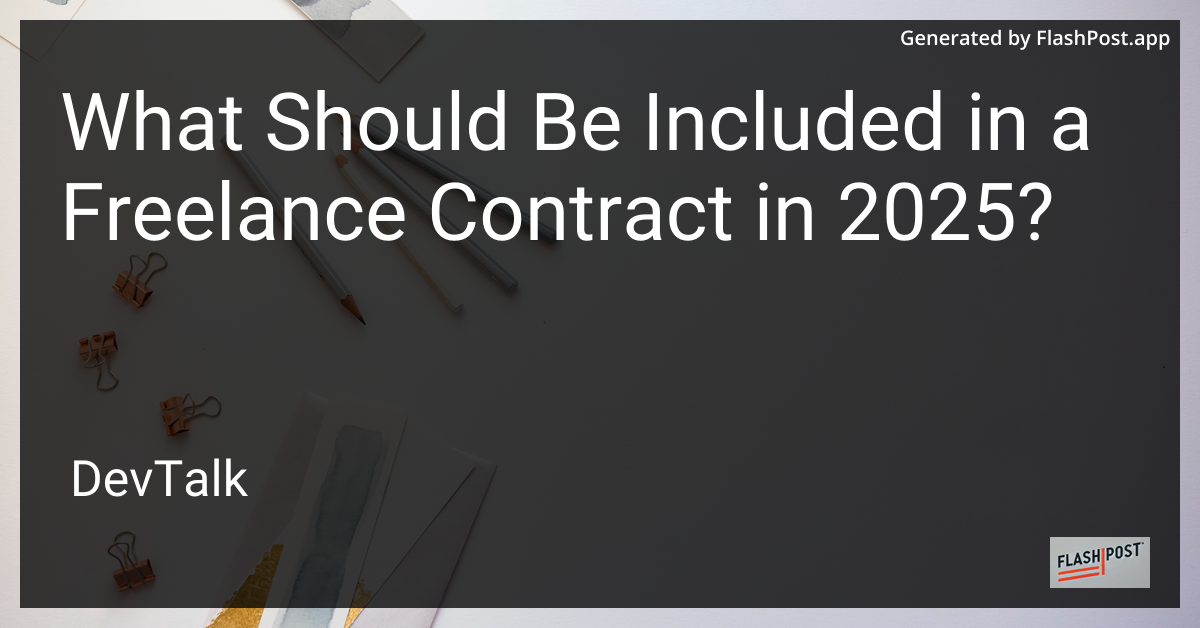What Should Be Included in a Freelance Contract in 2025?
 # What Should Be Included in a Freelance Contract in 2025?
# What Should Be Included in a Freelance Contract in 2025?
In the evolving landscape of freelancing, a well-crafted contract is pivotal for establishing a secure and professional relationship between freelancers and clients.
By 2025, the dynamics of work have changed, and so have the expectations for a comprehensive freelance contract. Here’s an in-depth guide on what should be included in a freelance contract to ensure clarity, protection, and mutual understanding.
Key Elements of a Freelance Contract
-
Scope of Work
The scope of work should clearly define the project details, deliverables, and deadlines. It is vital that both parties have a mutual understanding of what is expected. This section avoids any ambiguity by specifying the tasks the freelancer will perform and any exclusions.
-
Payment Terms
Transparent payment terms are crucial. This section should include the following details:
- Rate of pay (hourly, fixed, or per project)
- Payment schedule (upon delivery, in installments, etc.)
- Method of payment (bank transfer, PayPal, etc.)
- Late payment penalties or incentives for early payment
-
Revisions and Edits
Clearly specify the number of revisions included in the initial project cost and any fees for additional revisions. This helps prevent potential disputes over revisions and ensures expectations are aligned.
-
Intellectual Property Rights
Freelancers and clients should agree on who owns the work upon completion. Specify whether rights are transferred to the client, retained by the freelancer, or shared. This provision prevents future conflicts regarding the use and ownership of the work.
-
Confidentiality Agreement
A confidentiality or non-disclosure agreement (NDA) is essential if the project involves sensitive information. It ensures that all proprietary information remains confidential and is not disclosed to third parties.
-
Termination Clause
Outline conditions under which the contract can be terminated by either party. Include any required notice period and any obligations that must be met prior to termination to protect both parties from sudden contract cessation.
-
Indemnity Clause
An indemnity clause protects both parties from legal liabilities arising during the course of the project. It specifies who is responsible for damages or claims that may surface.
-
Dispute Resolution
Specify how disputes will be resolved, whether through mediation, arbitration, or in court. This provision can help avoid prolonged conflicts and keeps relationships amicable.
-
Client Responsibilities
Outline any responsibilities or resources the client needs to provide for the project’s success. This ensures that freelancers have everything required to complete the work efficiently.
-
Force Majeure
Include a force majeure clause to protect both parties from unforeseen events like natural disasters, pandemics, or political instability that could impede the project's completion.
Why a Detailed Freelance Contract Matters
In 2025, the need for robust freelance contracts is more significant than ever. The freelancing community is thriving and becoming an integral part of the global workforce. Having a comprehensive contract not only fortifies professional relationships but also mitigates risks, fostering trust and clarity.
As the gig economy grows, so do the resources available for freelancers. For those interested in financial aid, learn about cash loans for freelancers. Further, to expand your client base and find robust opportunities, explore best freelance websites and tools on best freelance apps.
By including these crucial elements in your freelance contract, you can navigate the freelance world confidently, ensuring success and stability in every project you undertake.